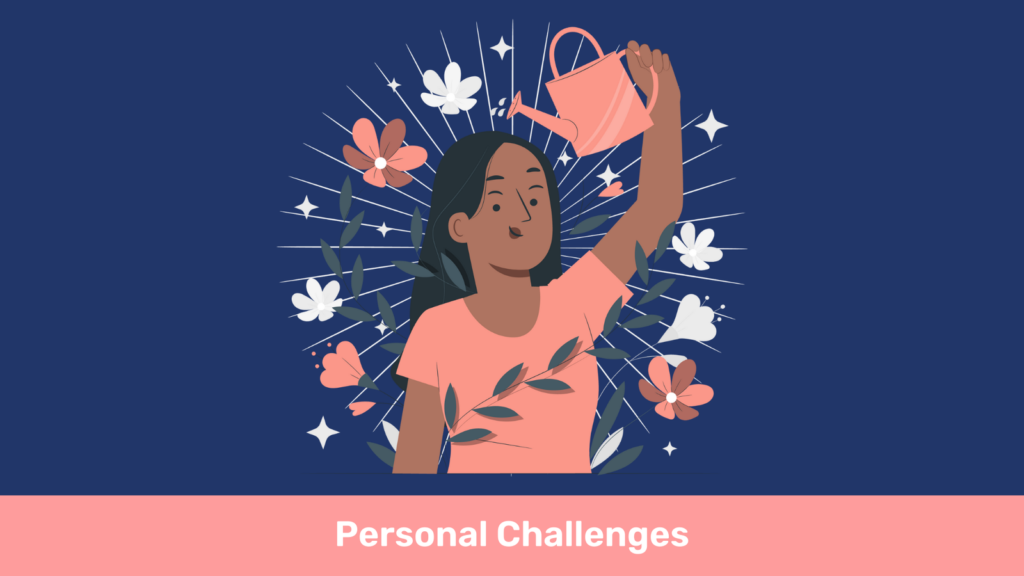Introduction
Welcome to a journey of self-transformation and growth. In this guide, we delve into the concept of personal challenges – powerful catalysts for profound life changes. Each challenge is an opportunity to stretch the boundaries of your comfort zone, unlock new potentials, and foster significant personal growth.
Embarking on personal challenges isn’t just about achieving specific goals; it’s about the journey towards becoming a better version of yourself. These challenges are designed to push you, gently but firmly, out of the familiar territories of your daily routine and into new realms of possibilities. Whether it’s adopting healthier habits, learning new skills, or changing the way you think and act, each step you take is a leap towards a more fulfilling life.
As you read on, remember that growth often happens at the edge of your comfort zone. So, let’s step across that line together and explore what lies beyond – a path to transformation, empowerment, and self-discovery awaits.
Challenge 1: Waking Up Early – Personal Challenges for a Productive Start

One of the most impactful personal challenges you can undertake is to wake up early. Embracing the early morning hours offers a serene window for productivity and self-improvement, setting a positive tone for your entire day.
Benefits of This Personal Challenge:
-
- Boosted Productivity: Early mornings are typically free from distractions, allowing you to focus intensely on your tasks or personal projects.
- Enhanced Mental Health: Establishing a morning routine provides a sense of control and purpose, leading to reduced stress levels and a brighter outlook on life.
- Quality Time for Self-Care: The quiet morning hours are perfect for engaging in activities like meditation, exercise, or reading, which you might struggle to fit into a hectic day.
Tips for Gradually Adjusting to This Personal Challenge:
-
- Start Small: Wake up just 15 minutes earlier than your usual time, gradually increasing this as your body adapts.
- Establish a Calming Pre-Sleep Routine: Engage in relaxing activities before bed to signal to your body that it’s time to wind down.
- Create an Ideal Sleep Environment: Ensure your bedroom promotes good sleep — consider factors like temperature, light, and noise.
- Consistency is Key: Aim to wake up at the same time daily to regulate your body’s internal clock.
- Have a Morning Plan: Decide in advance how you’ll use your extra morning time. Having activities you look forward to can make waking up early something to be excited about.
Adopting the personal challenge of waking up early can lead to a more disciplined, focused, and fulfilling lifestyle. It’s about more than just changing your wake-up time; it’s about transforming how you approach each day.
Challenge 2: Daily Exercise – Personal Challenges for Health and Vitality

Embracing daily exercise as one of your personal challenges is a commitment to your overall health and well-being. Regular physical activity is crucial, not just for physical fitness but for mental health as well. A study in “The Lancet Psychiatry” journal found that people who exercised regularly had 43.2% fewer days of poor mental health than those who didn’t. This makes daily exercise a powerful tool for enhancing your quality of life.
Integrating Daily Exercise into Your Routine:
-
- Find Enjoyable Activities: Choose forms of exercise you love, be it walking, yoga, or a sport. Enjoyment is key to consistency.
- Start Small, Then Grow: Begin with short, manageable sessions and gradually increase their duration and intensity.
- Make It Convenient: Fit exercise into your schedule in a way that feels natural and doable, whether it’s a morning jog or an evening dance class.
- Vary Your Workouts: To keep things interesting and work different muscle groups, mix up your routines.
- Celebrate Your Progress: Keep track of your exercise habits and acknowledge the improvements in your mood and energy levels.
By undertaking this personal challenge, you’re not just working towards a fitter body but also nurturing a happier, more resilient mind. Regular physical activity, as shown by the study, can significantly improve mental well-being, making it a key component of a balanced lifestyle.
Challenge 3: Mindful Eating – Personal Challenges for a Healthier Relationship with Food

The third personal challenge is mindful eating, a practice that encourages a deeper, more thoughtful relationship with the food you consume. It’s about being present in the moment and making conscious food choices, fostering a healthier approach to eating.
Understanding Mindful Eating in This Personal Challenge:
-
- Awareness: Mindful eating is about paying attention to the taste, texture, and aroma of your food, and noticing how it makes you feel.
- Connection: It’s recognizing the journey your food has taken from source to table and appreciating the nourishment it provides.
- Listening to Your Body: This involves tuning into your body’s hunger and fullness signals, eating when you’re genuinely hungry and stopping when you’re comfortably full.
Strategies for Mindful Eating:
-
- Eat Without Distractions: Avoid eating while working or watching TV. Instead, focus solely on your meal.
- Slow Down: Take time to chew your food thoroughly, which aids digestion and allows you to truly enjoy the flavors.
- Choose Quality Over Quantity: Opt for foods that are both nourishing and enjoyable. Quality ingredients can make even simple meals satisfying.
- Check-in Emotionally: Before you eat, ask yourself if you’re eating out of hunger or for other reasons like boredom or stress.
- Keep a Food Diary: Briefly jotting down what you eat and how you feel afterward can help identify patterns and encourage more mindful choices.
Embracing mindful eating as a personal challenge is not about restricting yourself; it’s about learning to enjoy food in a balanced and healthy way. It’s a step towards a more mindful lifestyle, where you’re fully engaged with the present moment and making choices that benefit both your body and mind.
Challenge 4: Digital Detox – Personal Challenges for Mental Clarity

The fourth personal challenge is to embark on a digital detox, an intentional break from digital devices. In our hyper-connected world, constant connectivity can lead to information overload, stress, and a detachment from the present moment. This challenge is about reclaiming your time and mental space from the digital world.
Benefits of Digital Detox in This Personal Challenge:
-
- Reduced Stress and Anxiety: Constant notifications and digital interruptions can contribute to elevated stress levels. Stepping away from digital devices can help in calming the mind.
- Improved Focus and Creativity: Unplugging allows your mind to reset, potentially boosting focus, creativity, and problem-solving abilities.
- Enhanced Real-world Connections: Spending less time on devices can open up more opportunities for in-person interactions and deepen your relationships.
Strategies for a Successful Digital Detox:
-
- Set Clear Boundaries: Establish specific times or areas in your home where digital device use is off-limits, like during meals or in the bedroom.
- Gradual Reduction: If the idea of completely unplugging is daunting, start by reducing your digital consumption in small increments.
- Find Offline Activities You Enjoy: Replace screen time with activities like reading, outdoor sports, or hobbies that don’t involve digital devices.
- Be Mindful of Your Consumption: When you do use digital devices, be conscious of the content you’re consuming and how it impacts your mood and well-being.
- Reflect on Your Experience: Take note of how the digital detox affects your mental and emotional state. Do you feel less stressed? More connected to the people around you?
Taking on the personal challenge of a digital detox can provide a refreshing mental reset, giving you a chance to connect more deeply with yourself and the world around you. It’s a step towards a more mindful, intentional way of living where you control your technology use, not the other way around.
Challenge 5: Learn a New Skill – Personal Challenges for Cognitive and Emotional Growth

The fifth personal challenge involves diving into the enriching experience of learning a new skill. Whether it’s a language, a musical instrument, coding, or even cooking, acquiring new skills can significantly enhance your cognitive abilities and emotional well-being.
Understanding the Benefits of This Personal Challenge:
-
- Cognitive Enhancement: Learning something new stimulates your brain, improving functions like memory and problem-solving skills.
- Boost in Self-Esteem: Mastering a new skill can be incredibly rewarding, leading to increased self-confidence and a sense of achievement.
- Emotional Well-being: The process of learning can be therapeutic, offering an escape from daily stresses and providing a sense of purpose and fulfillment.
Ideas and Strategies for Integrating New Skills into Your Life:
-
- Select a Skill That Excites You: Choose something you’ve always been curious about. Passion is a great motivator in the learning process.
- Set Realistic Goals: Break down the learning process into small, achievable steps to avoid feeling overwhelmed.
- Make Learning a Habit: Dedicate a specific time each day or week to focus on your new skill. Consistency is key to progress.
- Utilize Resources: Take advantage of online courses, local workshops, or apps designed for self-learning.
- Practice Patience: Remember that learning is a journey. Celebrate your progress, no matter how small, and be patient with yourself.
Embracing the personal challenge of learning a new skill not only diversifies your abilities but also nurtures your mental and emotional health. It’s a fulfilling journey that can bring joy, excitement, and a sense of accomplishment into your life.
Challenge 6: Financial Discipline – Personal Challenges for Financial Well-being

The sixth personal challenge is cultivating financial discipline, a vital aspect of overall well-being. This challenge focuses on developing a deeper understanding of financial health and implementing effective budgeting strategies. By gaining control over your finances, you reduce stress and create a more secure future.
The Role of Financial Health in Personal Well-being:
-
- Reduced Stress: Financial worries can be a significant source of stress. Gaining financial control brings peace of mind.
- Long-term Security: Good financial health means being prepared for emergencies, retirement, and other long-term goals.
- Empowerment: Understanding and managing your finances boosts your sense of independence and self-efficacy.
Steps to Achieve Financial Discipline:
-
- Educate Yourself: Learn the basics of personal finance, including saving, investing, and managing debt.
- Create a Budget: Develop a budget that reflects your income, expenses, and financial goals. There are many tools and apps available to help with this.
- Track Your Spending: Regularly monitor your spending habits. This can help identify areas where you can cut back.
- Set Savings Goals: Aim to save a portion of your income regularly, whether it’s for an emergency fund, a major purchase, or retirement.
- Avoid Unnecessary Debt: Be mindful of borrowing and use credit responsibly. Prioritize paying off high-interest debts.
- Review and Adjust Regularly: Your financial situation can change, so regularly review and adjust your budget and savings goals as needed.
Undertaking this personal challenge of financial discipline is about more than just balancing your budget; it’s about setting the stage for a secure and stress-free future. By taking control of your finances, you’re investing in your peace of mind and your long-term well-being.
Challenge 7: Regular Journaling – Personal Challenges for Mental Clarity and Growth

The seventh personal challenge is to establish a habit of regular journaling. Journaling is a powerful tool for self-expression and introspection, offering a unique way to support your mental health and facilitate personal growth.
The Benefits of Journaling in This Personal Challenge:
-
- Enhanced Self-Awareness: Writing down your thoughts and feelings can lead to greater self-understanding and mindfulness.
- Stress Reduction: Journaling can be a therapeutic way to process emotions, reduce anxiety, and manage stress.
- Problem-Solving: It helps in clarifying thoughts and challenges, often leading to creative solutions and perspectives.
Tips for Incorporating Journaling Into Your Routine:
-
- Choose Your Medium: Whether you prefer a traditional notebook or a digital app, select a journaling medium that feels comfortable and accessible.
- Set a Regular Time: Dedicate a specific time each day for journaling to help develop a consistent habit.
- Write Freely: Don’t worry about grammar or style; the key is to express yourself openly and honestly.
- Use Prompts: If you’re unsure what to write about, use prompts or questions to get started.
- Reflect on Your Entries: Periodically look back at your previous entries. This can offer insights into your personal growth and changes in perspective over time.
- Keep It Private: Remember, your journal is a personal space. Keeping it private can make you feel safer to express yourself fully.
Taking on the personal challenge of regular journaling can significantly enhance your mental well-being. It’s a simple yet profound practice that offers a window into your inner world, helping you understand and navigate your thoughts and emotions more effectively.
Challenge 8: Volunteer Work – Personal Challenges for Community Connection and Impact

The eighth personal challenge is to engage in volunteer work. Volunteering not only contributes positively to society but also enriches your own life, offering a profound sense of purpose and connection. It’s about giving back, learning new things, and making a tangible impact in the lives of others.
Benefits of Volunteering in This Personal Challenge:
-
- Personal Growth: Volunteering can provide new experiences, teach valuable skills, and offer a deeper understanding of diverse life perspectives.
- Enhanced Well-being: Helping others has been linked to improved mood, greater happiness, and even better physical health.
- Community Connection: Volunteering fosters a sense of belonging and strengthens community ties.
Finding the Right Volunteering Opportunities:
-
- Align with Your Interests: Look for volunteer opportunities that resonate with your passions. Whether it’s environmental conservation, animal welfare, or helping at a local food bank, choose causes you feel strongly about.
- Match Your Skills: Consider your unique skills and how they could be beneficial to an organization. This could range from hands-on work to offering professional expertise.
- Explore Local and Online Options: Check community centers, online platforms, or local nonprofits for available opportunities. Don’t forget virtual volunteering options, which can be just as impactful.
- Set a Manageable Commitment: Be realistic about the amount of time you can dedicate to volunteering. It’s important to find a balance that fits your lifestyle.
- Reflect on Your Experience: Consider journaling about your volunteering experiences. Reflect on what you’ve learned and how the experience has impacted you.
Embracing the personal challenge of volunteer work is a powerful way to contribute to society while also nurturing your own growth and happiness. It’s a fulfilling pursuit that broadens your horizons and deepens your connection to the world around you.
Challenge 9: Reading More Books – Personal Challenges for Intellectual and Emotional Enrichment

The ninth personal challenge is to cultivate the habit of reading more books. Regular reading not only broadens your intellectual horizons but also offers emotional benefits, making it a rewarding and enriching pursuit for anyone.
Benefits of Regular Reading in This Personal Challenge:
-
- Knowledge Expansion: Reading exposes you to new ideas, cultures, and perspectives, significantly broadening your knowledge and understanding of the world.
- Stress Reduction: Getting lost in a good book can be a great escape, providing a mental break and reducing stress.
- Improved Cognitive Function: Regular reading enhances memory, improves focus, and stimulates mental processes.
- Emotional Connection: Books can evoke empathy, joy, and other emotions, providing a deep and resonant emotional experience.
Strategies for Integrating More Reading Into Your Life:
-
- Set Clear Reading Goals: Whether it’s a certain number of books per year or a set amount of time each day, having clear goals can motivate you to read more.
- Create a Reading Routine: Find a specific time in your day for reading, even if it’s just a few minutes. Consistency helps develop a lasting habit.
- Choose Books That Interest You: Reading should be enjoyable. Select books that genuinely interest you, whether for leisure or personal development.
- Utilize Different Formats: Explore audiobooks or e-books if you find them more convenient, especially during commutes or while multitasking.
- Join a Book Club: This can offer motivation, social interaction, and exposure to books you might not have chosen on your own.
- Reduce Screen Time: Swapping some of your screen time for reading can significantly increase your available time for books.
Embracing the personal challenge of reading more books is an excellent way to enhance your cognitive abilities, reduce stress, and find joy and relaxation in the written word. It’s a simple yet profound activity with lasting impacts on both your mind and heart.
Challenge 10: Practicing Gratitude – Personal Challenges for a Positive Outlook

The tenth and final of our personal challenges is practicing gratitude daily. Cultivating a sense of gratitude can have a profound impact on your mental health and overall perspective on life. It’s about recognizing and appreciating the good in your life, even in small, everyday experiences.
The Impact of Gratitude on Mental Health and Perspective:
-
- Enhanced Mental Well-being: Regularly expressing gratitude is linked to greater happiness, lower stress, and reduced symptoms of depression.
- Improved Relationships: Acknowledging and appreciating others can strengthen your connections and foster positive interactions.
- Resilience: A gratitude practice can help you navigate tough times with a more optimistic outlook, building emotional resilience.
Developing a Gratitude Practice:
-
- Keep a Gratitude Journal: Dedicate a few minutes each day to write down things you’re grateful for. These can range from significant events to simple pleasures.
- Gratitude Reminders: Set aside a specific time or trigger (like during your morning routine or before bed) to reflect on your gratitudes.
- Express Gratitude to Others: Regularly tell people in your life what you appreciate about them, whether through a simple ‘thank you’, a note, or a kind gesture.
- Mindful Appreciation: Throughout your day, take moments to mindfully appreciate your surroundings and experiences. This could be as simple as savoring a cup of coffee or enjoying a moment of sunshine.
- Reflect on Challenges: Try to find something to be grateful for in difficult situations or challenges. This shift in perspective can transform obstacles into opportunities for growth.
Adopting the personal challenge of practicing gratitude can change the way you view the world and interact with others. It’s a simple habit with the power to bring more joy, contentment, and positivity into your life.
Conclusion
As we wrap up our exploration of these ten personal challenges, it’s important to remember that the journey towards self-improvement is ongoing and ever-evolving. Each of these challenges, when undertaken, has the potential to bring about significant transformations in your life. They are stepping stones to personal development, offering you new insights, habits, and perspectives.
Embarking on these challenges isn’t just about making big leaps; it’s the small, consistent changes in your daily life that accumulate and lead to profound growth. Whether it’s waking up early, practicing gratitude, or learning a new skill, each step you take contributes to a stronger, more resilient, and more fulfilled you. The key is persistence and a willingness to step out of your comfort zone.
For those looking to streamline this journey and track their progress, platforms like Woliba can be a great ally. Woliba provides the tools and resources to help you manage and monitor your personal development goals. By offering a platform to track your progress, engage with a community for support, and access resources for continuous learning, Woliba stands as a partner in your quest for personal growth. It’s about harnessing the power of technology to enhance your journey of self-improvement and well-being.
So, as you consider taking on these personal challenges, think of them as investments in your greatest asset – yourself. With dedication, resilience, and the right tools at your disposal, there’s no limit to the growth and fulfillment you can achieve. Contact us today!











